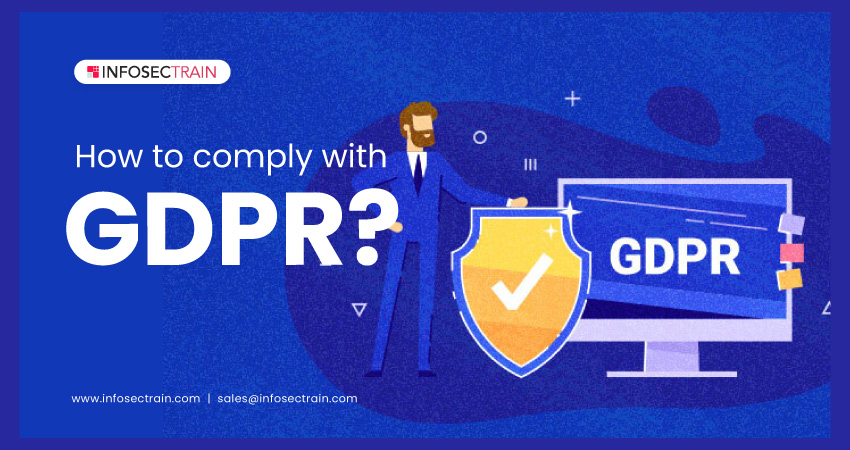How to comply with GDPR?
In 2018, the European Union’s General Data Protection Regulation (GDPR) came into effect, introducing a set of rules that companies must follow when collecting and processing the personal data of individuals within the European Union (EU). GDPR furnishes individuals with greater control over their personal information, and it places new obligations on companies to protect the privacy and security of the data they collect. Failure to comply with GDPR can cause severe consequences like hefty fines and reputational damage. Therefore, it is crucial for businesses to understand the GDPR requirements and implement the necessary measures to comply with them. In this article, we will examine how businesses can comply with GDPR.

What is GDPR?
The General Data Protection Regulation, or GDPR, is a comprehensive data privacy law that governs how companies collect, use, and store the personal data of individuals within the European Union. It was implemented on May 25, 2018, to strengthen data protection rights and increase transparency around how personal data is processed. It also applies to any organization that processes the personal data of EU residents, regardless of where the organization is located. It requires companies to obtain explicit consent for data collection, provide clear and concise privacy notices, and allow individuals to access, correct, and delete their personal data upon request. It also mandates that companies report data breaches to authorities and affected individuals within 72 hours. Non-compliance with the GDPR can result in significant fines.
How to comply with GDPR?
If your organization collects or processes the personal data of EU citizens, it is important to comply with GDPR to avoid hefty fines and maintain the trust of your customers. The following are various steps you can take to comply with GDPR:
- Understand the GDPR requirements: The first step to GDPR compliance is to understand the requirements of the regulation. You can do this by reading the GDPR text, which outlines the principles and rights of individuals and the obligations of data controllers and processors.
- Appoint a Data Protection Officer (DPO): Under GDPR, organizations that process massive amounts of personal data or sensitive data must appoint a Data Protection Officer (DPO). A DPO is responsible for ensuring GDPR compliance, providing advice on data protection issues, and serving as a point of contact for individuals and regulatory authorities.
- Conduct a Data Protection Impact Assessment (DPIA): A DPIA is a risk assessment that helps you identify and mitigate risks associated with processing personal data. It is a mandatory requirement for organizations that process high-risk data, such as health data or data concerning criminal convictions.
- Implement appropriate technical and organizational measures: GDPR requires organizations to implement various appropriate technical as well as organizational measures to ensure the security and confidentiality of personal data. This includes measures such as pseudonymization, encryption, and access controls.
- Obtain consent from data subjects: Under GDPR, organizations must obtain valid consent from data subjects before processing their personal data. Consent must be granted voluntarily, consciously, specifically, and unambiguously. Organizations must also provide data subjects with the right to withdraw their consent when they will.
- Respond to data subject’s requests: GDPR gives individuals several rights, including the right to access, rectify, erase, and object to the processing of their personal data. Organizations must have procedures in place to respond to these requests within one month.
- Report data breaches: Under GDPR, within 72 hours of becoming aware of a data breach, organizations are obligated to notify the relevant supervisory authority. Additionally, they must notify impacted individuals if the breach poses a substantial risk to their rights and freedoms.
- Train employees on GDPR compliance: All employees who handle personal data should be trained on GDPR compliance to ensure that they understand their obligations and can identify and report any potential breaches.
Final words:
Compliance with the GDPR is essential for organizations that process the personal data of EU residents. The GDPR aims to protect the privacy and security of personal data, and failure to comply with its requirements can result in significant financial penalties and reputational damage. Businesses must understand their data processing operations, adopt suitable technological and organizational measures to protect personal data, get consent from individuals, and designate a Data Protection Officer (DPO) if required to comply with the GDPR. Ongoing compliance efforts, such as regular training and audits, are also necessary to ensure that businesses continue to comply with the GDPR’s requirements. By following these guidelines, businesses can safeguard personal data and build trust with their customers while avoiding the risks and consequences of non-compliance.
InfosecTrain’s General Data Protection Regulation (GDPR) training course can help you understand GDPR by providing a comprehensive overview of the regulation’s principles, requirements, and implementation strategies. The course covers topics such as data protection principles, data subjects’ rights, the lawful basis for processing, data breaches, and compliance strategies. It also explains how GDPR affects various organizations, including data controllers, processors, and third-party vendors. By taking this course, you will gain a solid understanding of GDPR’s scope and purpose, as well as the technical and legal aspects of compliance. The course also includes practical examples and case studies to help you apply GDPR principles to real-world scenarios.




 1800-843-7890 (India)
1800-843-7890 (India) 
